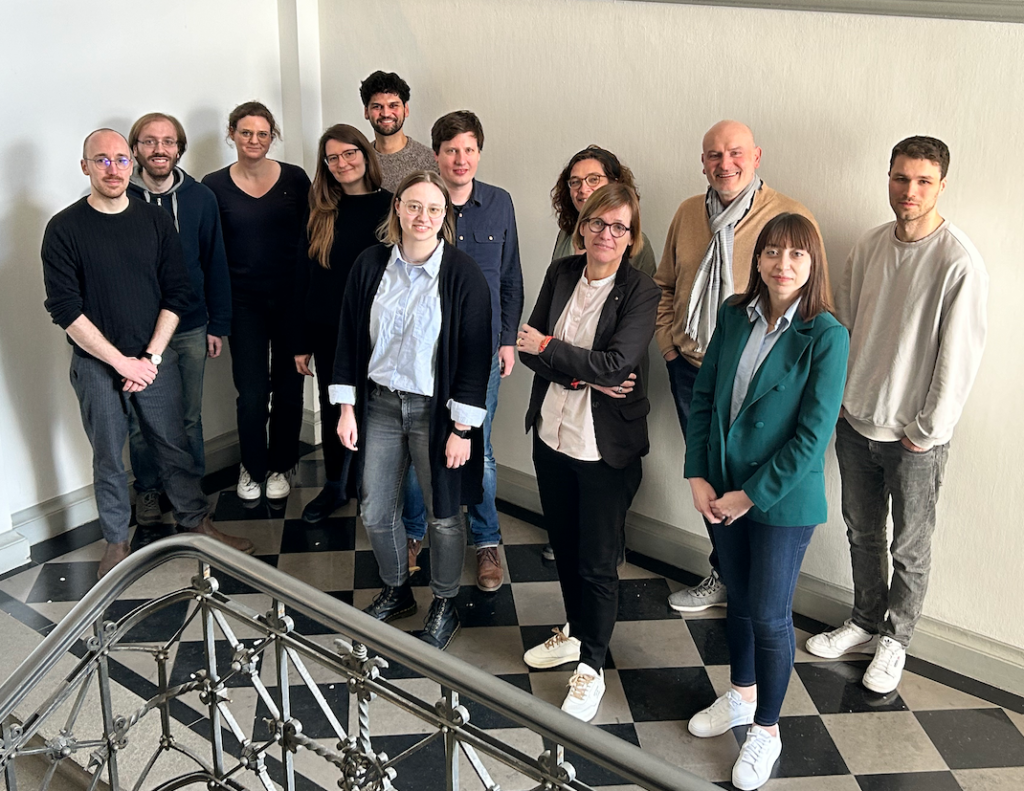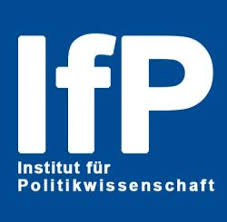
VeSPoTec is a research network that includes institutes from RWTH Aachen University, Forschungszentrum Jülich, the TU Darmstadt and the University of Duisburg-Essen. Funded by the German Federal Ministry of Education and Research (BMBF), it brings together scientists from the natural and social sciences to make a contribution to peace and conflict research. Associated partners include the University of Vienna and the Vienna Center for Disarmament and Non-Proliferation (VCDNP). The research focus is on verification.

Our Mission
VeSPoTec addresses the topics of verification of nuclear nonproliferation, arms control, and disarmament commitments. At its heart lies what we consider the nature of verification: Technologies and technical analyses interact with the political nature of nuclear governance and form a social practice of confidence-building and compliance assessment.
VeSPoTec seeks to study these linkages through an interdisciplinary approach involving natural science, social constructivism, strategic studies, and the sociology of knowledge. By integrating these perspectives to uncover the various factors that underlay how verification functions, we seek to contribute to addressing challenges to verification regimes on the horizon. We are focussing our research in three core topics:
- Safeguards under Crisis Conditions
- Reliability – Verification in a Multiplex World Order
- Irreversibility
Current global events such as natural disasters, war, or socio-political crises can have significant impacts for the implementation of IAEA safeguards, as do new technologies the IAEA can exploit. Limited on-site access and increasing cyber threats are just some of many examples that can negatively affect the international nuclear verification regime. An interdisciplinary scientific approach can help to provide a critical analysis of the safeguards system, to better understand how future events and crises can impact it and how it can best adapt to them.
Many studies and reports have addressed ways and means for strengthening safeguards generally. However, only few publications have focused on how to increase resilience of safeguards in crises situations. Even less research has been conducted on the evaluation of safeguards effectiveness against this background – and this is one of our focal points.
We approach the issue from three levels of analysis that interact with each other. The first level of analysis has a broad focus, looking at wider geopolitical or technological developments. The second level of analysis focuses on the IAEA as a socio-technical regime. The third and final level of analysis focuses on the R&D niche of safeguards technologies. Depending on our disciplinary interests, we concentrate on different levels of analysis. For example, the RWTH Institute for Political Science (IPW) focuses on the broader political dynamics of the first level, the Forschungszentrum Jülich (FZJ) is interested in concepts and methods for assessing the effectiveness and resilience of IAEA safeguards (second level), and the RWTH Aachen Human Technology Center focuses on knowledge production within R&D (third level). All levels of analysis cannot be approached in isolation but must be seen as interdependent.
Currently, we are engaged in three research sub-projects. The first sub-project, titled “Measuring Effectiveness of Safeguards,” includes the analysis and assessment of qualitative and quantitative factors of safeguards effectiveness. The second sub-project, “Measuring Resilience of Safeguards,” aims to analyze and assess qualitative and quantitative factors of safeguards resilience. Finally, the third is titled “From Research to Practice,” and intends to analyze and evaluate the diffusion factors of verification technology from research and development into IAEA safeguards.
In the last few years, the global order has undergone many structural changes that bring a series of challenges, but also opportunities, on how to manage international affairs. Political theories have sought new ways to make sense of those changes by advancing concepts such as multiplexity. A multiplex world order addresses changes not only in terms of multipolarity (comparative power capabilities of states) but also in terms of fragmentation and an increased role of non-state actors. In a nutshell, global affairs have become messier, with a multiplicity of actors, including regional and great powers, regional orders, intergovernmental and non-state institutions. Given that context, VeSPoTec’s core research topic on “reliability” aims at how to make sense of these new developments and to understand how they affect the implementation of current and the creation of new nuclear verification mechanisms for nonproliferation, arms control and disarmament.
Reliability stands out as a critical factor for verification. It is defined as “the quality of being trustworthy or of performing consistently well” (Cambridge Dictionary 2023). Reliable verification mechanisms are essential for establishing credible arms control mechanisms in a multiplex world. This concept holds two dimensions. First, we have the “trustworthiness” dimension, which addresses the credibility of actors (e.g. individuals, states, regional or international institutions) in situations where they could in principle deceive (Wheeler 2018). Under this perspective, we address issues such as worldviews, mindsets, normative expectations, notions of justice and injustice, and how perceptions and images of self and others are shaped by actors and affect the creation and conduction of verification activities. The second dimension addresses the “performance” aspect of reliability by looking at geostrategic elements, such as cost-benefit calculations, threat perceptions, enforcement mechanisms, and (in)balances of power. To assess these dimensions in a more cohesive and extended manner, we apply them in three levels of verification activities: state (policy-making level), institutional (inspectorate/operational level) and non-state (societal level).
Irreversible nuclear disarmament (IND) is complicated by the fact that all disarmament steps can in principle be reverted: Disarmed States retain knowledge on building a nuclear weapon, and many of the related facilities and materials are dual-use, which means they can serve for military and civilian purposes. Irreversibility concerns the whole disarmament process, e.g., the dismantlement of the warheads, the treatment of the fissile material, or, on a larger level, the elimination of the whole nuclear weapons complex. At VeSPoTec, we are interested in the verification of IND: What are the specific verification challenges linked to irreversibility?
Several papers and reports have already been written on IND (e.g. by SIPRI (2011), VERTIC (2011), IPNDV (2018), or CSIS (2023)), and they all conclude that comprehensive approaches for irreversibility always require a combination of various types of measures. In VeSPoTec, we seek to assess the role and interplay of technical, political and social factors in how verification can contribute to irreversible nuclear disarmament.
All VeSPoTec institutes aim for direct involvement with the following key questions:
- What are critical technical methods for verifying irreversibility? (e.g., nuclear archaeology and systems-based approaches)
- How much uncertainty is acceptable? Which and how much knowledge is essential?
- How can trust between relevant stakeholders hinder or enable the verification of IND? How do political contexts and institutional-normative frameworks intersect with new verification methods?
- Can reliable measures to verify IND enhance the chance of cooperation between nuclear powers?
Currently, we are engaged in two research projects. A collaboration between NVD and HumTec addresses (Non-)Knowledge within Nuclear Archaeology. Our idea here is to re-evaluate the potential of nuclear archaeology, a field in which methods to understand the past production of fissile material are developed, by combining technical and social science perspectives. We are specifically interested in the role of quantitative limitations and uncertainties when considering the social and political processes in verification and decision-making. Furthermore, a collaboration between the research center Jülich and NVD focuses on a Systems-based Approach for Verifying Irreversible Nuclear Disarmament. The guiding question for this project is how irreversibility can be verified in a state once all warheads have been dismantled. By taking a holistic perspective on the State, we investigate whether and how systems-based approaches, which the IAEA employs for the IAEA State-level concept in the context of nonproliferation, could be used to verify the absence of steps toward rearmament.
The Consortium

To solve complex nuclear verification challenges, our project brings together experts from the natural, social and political sciences. Nuclear Verification and Disarmament (NVD), TU Darmstadt (TUDa) and Forschungszentrum Jülich (FZJ) develop technical verification methods, The institutes of political sciences of RWTH Aachen University (IPW) and the University of Duisburg/Essen (UDE), as well as the Human Technology Center (HumTec) contribute political and social perspectives.
Our scientific partner, the University of Vienna, analyzes historical trust-building, while our practical partner, the Vienna Center for Disarmament and Non-Proliferation (VCDNP), conveys our findings to decision-makers and practitioners.
Together we strive for safe and effective verification strategies.
Why an interdisciplinary approach?
Technologies and technical analyses interact with the political nature of nuclear governance and form a social practice of confidence building and compliance assessment. VeSPoTec seeks to explore these connections through an interdisciplinary approach involving the natural sciences, social constructivism, strategic studies, and the sociology of knowledge. By integrating these perspectives to uncover the various factors that underlie how verification works, we seek to contribute to addressing the challenges to verification regimes on the horizon.
The uniqueness of the project lies in the collaboration between researchers with different focuses as well as in practice, supported by an advisory board of international experts, the NGO VCDNP and the University of Vienna. This inter- and transdisciplinary work creates a synergy that enables a holistic view of the complex issues of verification and the development of sustainable solutions. Regular workshops are used to collaborate and communicate effectively. This is a challenging undergoing, as it requires overcoming the barriers of disciplinary boundaries and terminologies.
Each of the institutes is represented in VeSPoTec with its own area of expertise. The following list shows the focus of each institute:

Nuclear Waste Management (IEK-6), Forschungszentrum Jülich
Safeguards, verification scenarios
Human Technology Center, RWTH Aachen University
Knowledge and knowledge infrastructures in verification
 Institute of Political Science, RWTH Aachen University
Institute of Political Science, RWTH Aachen University
Strategic perspective on the stability of verification regimes


Institute of Political Science, University of Duisburg/Essen
Trust: Verification as a political process
 Nuclear Verification and Disarmament, RWTH Aachen University
Nuclear Verification and Disarmament, RWTH Aachen University
Nuclear archaeology
Science for Nuclear Diplomacy, TU Darmstadt
Nuclear archeology
